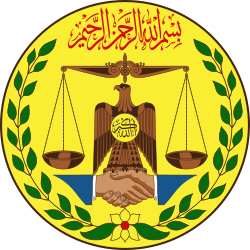
 |
|---|
Parliamentary elections were held in British Somaliland on 17 February 1960. The result was a victory for the Somali National League (SNL), which won 20 of the 33 seats in the Legislative Council. [1] [2]

 |
|---|
Parliamentary elections were held in British Somaliland on 17 February 1960. The result was a victory for the Somali National League (SNL), which won 20 of the 33 seats in the Legislative Council. [1] [2]
Although a Legislative Council had been elected in 1959, a new constitution led to the Council having an elected majority; 33 elected seats and three government officials. [3]
The 33 elected members of the Council were elected in single-member constituencies by first-past-the-post voting. [3]
| Party | Votes | % | Seats | +/– | |
|---|---|---|---|---|---|
| Somali National League | 42,395 | 52.10 | 20 | New | |
| National United Front | 20,249 | 24.89 | 1 | −6 | |
| United Somali Party | 13,350 | 16.41 | 12 | New | |
| Somali Youth League | 4,626 | 5.69 | 0 | New | |
| Other parties | 746 | 0.92 | 0 | − | |
| Total | 81,366 | 100.00 | 33 | +21 | |
| Source: Nohlen et al. | |||||